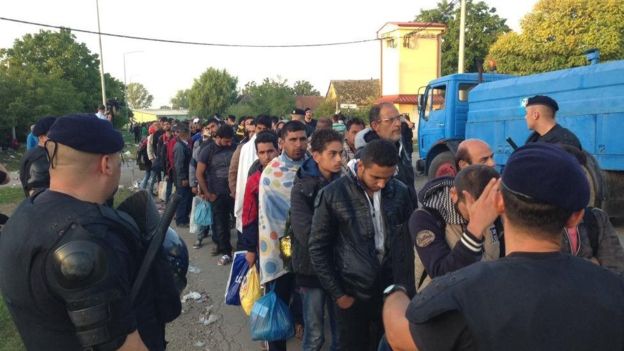Croatia has closed seven of its eight road border crossings with Serbia following a huge influx of migrants.
Officials said they had no choice after more than 11,000 people entered the country since Hungary fenced off its border with Serbia earlier this week.
Many have been taken by bus to reception centres but some say they plan to walk to neighbouring Slovenia.
Huge numbers of people heading north from the Mediterranean have created a political crisis in the European Union.
Croatian officials said roads leading to the border crossings had also been shut.
The crossing on the main road linking Belgrade and Zagreb – at Bajakovo – appeared to be the only one left open.
Freedom of movement is disappearing in south-east Europe. Slovenia has suspended rail connections with Croatia after around 150 refugees arrived by train. And Croatia has now joined Hungary in closing most of its road borders with Serbia.
The authorities in Zagreb say they had no choice. More than 11,000 refugees have entered the country since Wednesday – the day after Hungary criminalised unofficial border crossings.
Croatia has attempted to take the newcomers to asylum centres – but the overwhelming numbers mean that many people have been left on the streets.
Some have told the BBC they plan to walk north to neighbouring Slovenia which is in the EU’s border-free Schengen Area.
Grey line
On Thursday, Croatian Interior Minister Ranko Ostojic said his country was “absolutely full”.
He said his message to the migrants was: “Don’t come here any more. Stay in refugee centres in Serbia and Macedonia and Greece. This is not the road to Europe. Buses can’t take you there. It’s a lie.”
But a Reuters journalist at the scene reported that migrants were walking through fields to bypass one of the border crossings.
Scuffles broke out in two locations on the border with Serbia on Thursday after people were left waiting for hours for transport further north.
Crowds briefly broke through police lines at Tovarnik and Batina – two of the crossings now closed.
The BBC’s Lyse Doucet, at Tovarnik, said buses arrived just before midnight but not enough to transport everyone.
Drivers said people were being taken to a reception centre.
Thousands of people left behind spent the night sleeping on roadsides and in fields.
About 2,000 people are still waiting for transport but coaches are appearing regularly to take them away.
It was Hungary’s decision to seal its border with Serbia that triggered the move by thousands of migrants, who had travelled to Serbia via Macedonia and Greece, to try to reach Western Europe via Croatia instead.
Images of Hungarian police trying to disperse people with tear gas and water cannon have been criticised by the United Nations’ top human rights official.
Hungarian media reported on Thursday that migrants were crossing from Croatia into Hungary at Illocska, thus avoiding the razor-wire fence on Hungary’s border with Serbia.
Hungarian Prime Minister Viktor Orban told local radio on Friday that a fence was already being built on the Croatian border. Hungary is also planning a fence on the Romanian border.
Late on Thursday, Slovenian police said they had stopped a train carrying asylum seekers at Dobova on the border with Croatia.
Those on board the train shouted their dissatisfaction at journalists and at nearby police officers who were patrolling with dogs. Slovenian radio said 16 police vehicles had been sent to the station.
Police tried to take the migrants back to Croatia, but the Slovenian Press Agency reported that the Croatian authorities had refused to take them.
Rail traffic between the two countries is now suspended until at least Friday evening, it added.
The crisis has challenged the Schengen agreement, with Germany, Austria and Slovakia all re-imposing checks on parts of their borders.
EU regulations dictate the refugees must register and claim asylum in the first member state they reach. But many migrants and refugees wish to continue on to Germany and Austria, and do not wish to seek asylum in smaller, less well-off EU nations such as Hungary, Croatia and Slovenia.
The EU has called a leaders’ summit for 23 September to discuss the crisis.
The European Parliament has voted to back plans for the mandatory relocation of 120,000 refugees around the EU, but interior ministers from EU countries have not so far been able to reach agreement on them.
–
Source: BBC



